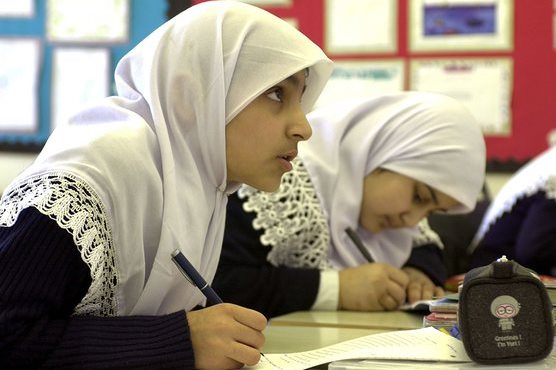Treating Muslim Children as Terror Suspects Does Not Make Britain Safer

It’s forcing teachers to be suspicious of free expression and creating a culture of suspicion.
In the last year, there has been growing unease around the government’s Prevent strategy. The UN special rapporteur, along with human rights groups and the government’s own independent reviewer of terrorism legislation, have voiced serious concerns. MPs and peers from the joint select committee on human rights have also called for an independent review.
Last summer, the government’s counterterrorism policy became a legal duty in schools and nurseries and for childcare providers. With just a few hours of training, a host of public sector workers were now expected to spot people who might be vulnerable to radicalisation, and refer them to the government’s deradicalisation programme,Channel.
The controversy around it has been growing as figures for the number of people reported to Channel shoot up. In March it was reported that almost 4,000 people– triple the number reported the year before – had been referred to Channel; almost 11 people a day. The Times reported that last year 1,041 children were referred by schools (in 2012 there were only nine).
There have been enough troubling examples to show how widely the net of suspicion is being flung. The four-year-old boy whose nursery teachers were said to have threatened to report him because he mispronounced cucumber as "cooker bomb”. The 14-year-old questioned over his answers in a French class about eco-terrorists. The teenager apparently reported to Channel for his political activism over Palestine. Or more recent claims of a boy questioned over a T-shirt which included the name of a historical Muslim figure.
I have also spoken to parents and community activists who tell more troubling stories; children questioned over stray remarks, attending early morning prayers, starting to wear hijab, or even just having over-active imaginations.
Prevent had a bad reputation even before it was pushed into schools. From its earliest incarnations, there were fears it was a form of mass surveillance of Muslim communities (particularly following the installation of 200 CCTV cameras in a majority Muslim area in Birmingham). Many community groups prefer not to publicise that they receive funds from Prevent because the stigma attached to it is so acute.
The government’s own reticence in publishing information about the strategy – from how success is measured, to what happens to the data of those referred – only increases suspicion. Many people, from police officers to MPs have agreed that it is a"toxic brand”.
This feeling has become more intense because Prevent now aims to deter people not just from violent extremism but also from "non-violent extremism”. This means not just worrying about people who might be terrorists, but also trying to clock anyone with "extreme” views. The government defines these views vaguely, as ideas that are opposed to "British values” – an equally vague term. As Harriet Harman said in the recent select committee report, the government’s policy is focused on the idea that there is "an escalator that starts with religious conservatism and ends with support for violent jihadism”. But this theory has never been proven, and critics point out that it allows the government to label any views they disagree with as a sign of extremism.
The National Union of Teachers has long expressed disquiet over Prevent, saying the duty to report has created a "culture of suspicion” in schools. Karon McCarthy, the Prevent officer and assistant principal at Chobham Academy, told the select committee that teachers might be "being a bit too enthusiastic and feeling very scared that if they do not report something, which is now a duty, they will somehow fall foul of the law”.
More recently, I have worried about the fact that teachers – however professional, caring, and fair-minded – are no more immune to the public rhetoric over Islam and terrorism than anyone else. And that rhetoric is increasingly toxic. Last week it was Kelvin Mackenzie, the former editor of the country’s then-highest selling newspaper, writing that a Muslim woman in hijab should not be reporting on terror attacks in Nice because of her religion (despite the fact many victims werealso Muslim).
Before that, it was the poisonous attempts during the London mayoral elections to smear Sadiq Khan because of his association with an imam who held unsavoury views. The same imam was even slandered as an Islamic State supporter in parliament, despite the fact he had consistently spoken out against the terrorist group.
When the national conversation about Islam and Muslims is so negative, it has a lasting effect. Being Muslim is seen at least as a factor in vulnerability to extremism, so Muslim students become less comfortable discussing controversial issues. Rights Watch UK reported: "Muslim children across the United Kingdom are self-censoring for fear of being reported under Prevent. Their fear is not unwarranted. We have uncovered a number of instances where children have been referred to Prevent for legitimately exercising their right to freedom of expression in situations where they pose no threat to society whatsoever.” Not only does this mean innocent children are being swept up in a panic over extremism, but those who do have disturbing views will not express them. Instead they will be hidden and allowed to fester.
Apart from a few terrifying exceptions, British Muslims want to protect their country and their young people as much as non-Muslims (who also have a few terrifying exceptions). Surveys show they are more patriotic than the wider community, and intelligence from Muslim communities is vital in countering terrorism. But for this to happen, British Muslims need to feel they are partners in keeping the country safe, not just suspects.
By Homa Khaleeli
Source: The Guardian



